Fanboy Flick Pick: The World’s End Doesn’t Wanna Grow up, it’s a Boys R Us Kid
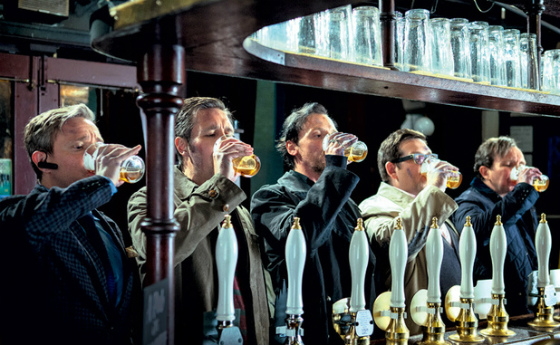 |
Perhaps because those of us now in our late 30s were the original action figure and video game generation, we’ve been enabled like no other to maintain a perpetual youth in our tastes, with toys and games having steadily become more and more elaborate as we’ve grown (“matured” would be the wrong word, perhaps). Our movie comedies often celebrate this, with likable man-child protagonists who communicate in Star Wars references and only gently get nudged into responsibility when the gorgeous woman of their dreams requires it.
Rarely is the man whose inner child cannot stay within portrayed quite as desperately as by Simon Pegg in The World’s End, which is deliciously ironic – an actor who in real life is the toast of Comic Con, famous for highly referential comedies and a rebooted sci-fi franchise (and evidently happy with it) deglamming to play the sort of guy who would be more likely to compulsively troll a convention for one-night stands.
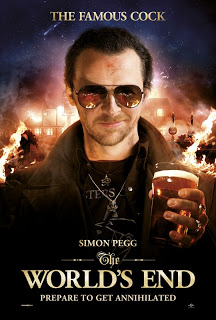 |
Pegg’s Gary King wants to get his four best friends back together for an epic pub crawl in their home town of Newton Haven, historic home of Britain’s first roundabout (for the uninitiated, those annoying traffic circles you have to merge into when a four-way stop would work just as well). Why? Mainly because while talking about it in an al-anon meeting, he realizes he’s never been as happy as when they all tried and failed to do it as teens. Using cajoling, manipulation, nostalgia and no small amount of lying, he manages to persuade the gang to give it another try for old time’s sake. Smart Oliver (Martin Freeman), lovelorn Steven (Paddy Considine), awkward Peter (Eddie Marsan) and grudge-bearing tee-totaller Andy (Nick Frost) all have lives, but they too wouldn’t mind recapturing the youthful magic, if not as obsessively.
If that were all there were to the movie, it’d still be compelling viewing, but undoubtedly inspired by From Dusk Till Dawn, director Edgar Wright changes things up about a third of the way in, as the alcohol-fueled arguments and buried grudges that begin to surface are interrupted by the inconvenient fact of a village in which every resident has been replaced by a blue-bleeding alien robot. As our heroes are significantly inebriated by the time they realize this, and none of them is particularly smart, they decide that the best thing to do is to stick to the pub crawl plan, so as not to draw undue attention to themselves. That it results in more beer all around is not incidental.
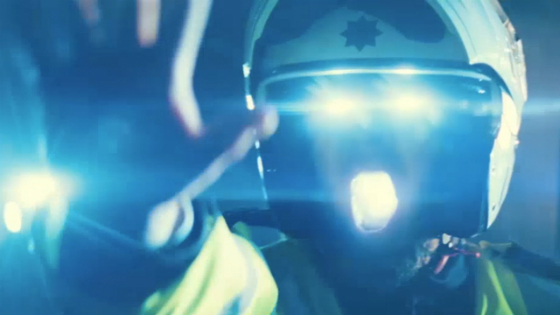 |
Representing the lads’ shared past, the robots can be read as suppressed memories trying to fight their way back to the surface, in conflict with the whole principle of drinking to forget. Once their goals are revealed, however, it’s easier to see them as embodying the kind of grown-up homogeneity that so many men fear – the normal job and the normal house and an end to the freedom to party all night and stick your Doc Marten-encased feet up on the furniture.
In a larger sense, the movie itself addresses our generation’s issues of growing up through the shared language of science fiction, one that we all understand better than we do any self-help book or didactic twelve steps. It also approaches them through a look at the fading British institution of the village pub itself – too many are becoming corporatized and homogenized, as our gang soon learns, and it’s one more big signifier that youthful days don’t exist any more (I suspect that for future generations of Britons, the classic pub will be what the ’50s diner is to us – something more often seen in conscious nostalgic re-creations than original genealogy).
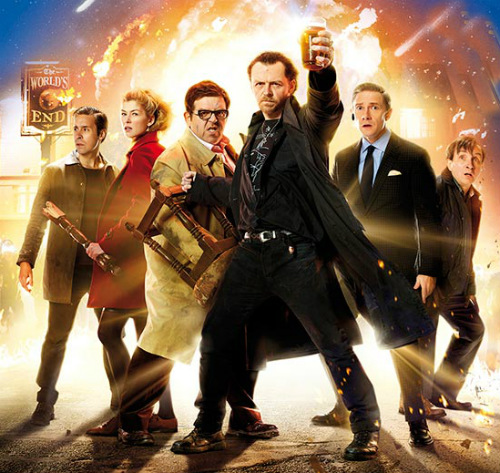 |
It’s a rather brilliant way to deal with that stuff, and for much of the movie I was prepared to say that The World’s End was easily the best of the Wright/Pegg/Frost collaborations. But then came that ending.
I’m going to try not to spoil too much and speak only in broad strokes, but those sensitive to additional knowledge may not want to turn the page.
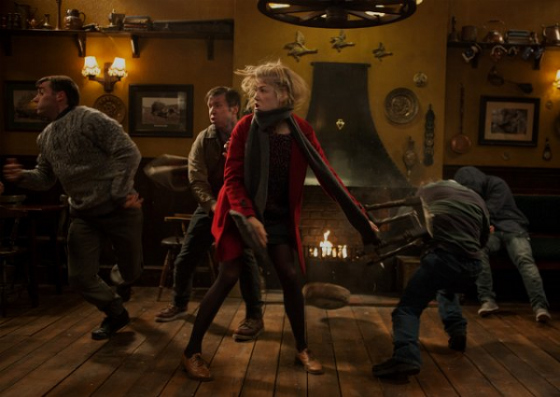 |
Okay, so it’s probably not giving away anything drastic to say that everything leads to a confrontation between that which controls the robots and our main characters. That what ensues is primarily dialogue may strike some as disappointing, but that’s not really the issue. What is said is frequently funny, but it also suddenly becomes as didactically libertarian as Elysium was PC-liberal. (I’m equal opportunity in my dislike of preachiness.) Not knowing Wright’s politics one way or the other, I half think that he borrowed a classic metaphor without thinking it through – the Body Snatchers, which these robots essentially are, were originally a metaphor for communism. They’ve been updated through the years to represent different kinds of conformity (Abel Ferrara made them a dig at the military, for example), but one thing remained consistent – they’ve always stood in for a kind of conformity the director himself felt truly opposed to.
So even as we may cheer that yay, our heroes are fighting back conformity, you have to ask precisely what that conformity is – and in this case, it’s maturity! The one thing all Gary’s friends have correctly been telling him he needs to get some of. There’s nothing wrong with a contrarian position here – if you want to insist that being a drunk is more awesome than being a responsible family man, go for it. But this script doesn’t do that. In wanting to have Gary be right but for the wrong reasons, it kinda-sorta cops out…
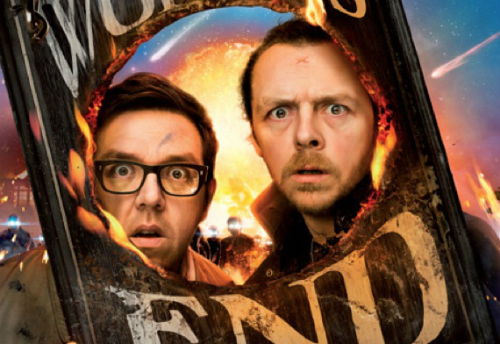 |
Except then, in the last five minutes, the movie takes a drastic lurch into almost a completely different genre, to the point that it feels like somebody told Wright there was a ton of money left over, he could do whatever he wanted, and he simply said, “Let’s throw in cool shit we come up with on the spot.” You can argue that in its convoluted way, it does make Gary thoroughly wrong…but you could probably argue the opposite as well, because it’s such an insane turn that putting too much thought into it is pointless, and it’s tough to reconcile with everything that’s come before. Chopping off these last few scenes would make the movie 100% better – or at least making them into a single throwaway gag shot rather than an entire new tangent.
It is fitting, in a way, that the movie can’t let go of its own geekiness long enough to give us a properly developed conclusion – like Gary’s life, it peaked early and can’t quite grow up in the end.
